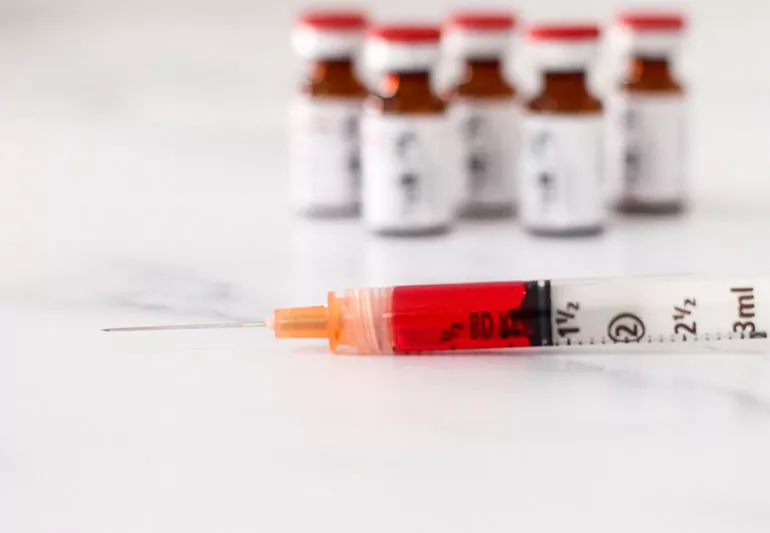Vitamin B12, also known as cobalamin, is a crucial water-soluble vitamin that plays a significant role in various bodily functions. It is essential for red blood cell formation, DNA synthesis, and maintaining the health of nerve cells. While many individuals can obtain sufficient amounts of vitamin B12 through a balanced diet that includes animal products, some may experience deficiencies that necessitate supplementation. One of the most effective ways to increase vitamin B12 levels in the body is through injections. This article explores the health advantages of vitamin B12 injections and their potential impact on overall well-being.
What are Vitamin B12 Injections?
Vitamin B12 injections involve administering the vitamin directly into the muscle, typically in the upper arm or thigh. This method allows for immediate absorption into the bloodstream, bypassing the digestive system, which can be particularly beneficial for individuals with absorption issues or those who do not consume enough B12 through their diet.
Who Needs Vitamin B12 Injections?
Certain groups of people are more susceptible to vitamin B12 deficiency and may benefit from injections:
- Vegetarians and Vegans: Since B12 is primarily found in animal products, those following a plant-based diet may not get enough from their food.
- Older Adults: Age-related changes can lead to decreased absorption of B12 from food sources.
- Individuals with Malabsorption Disorders: Conditions like Crohn’s disease, celiac disease, and atrophic gastritis can impair the body’s ability to absorb B12.
- Those with Pernicious Anemia: This autoimmune condition affects the stomach’s ability to produce intrinsic factor, a protein necessary for B12 absorption.
- Certain Medications: Long-term use of medications such as proton pump inhibitors (PPIs) and metformin can interfere with B12 absorption.
Health Advantages of Vitamin B12 Injections
- Boosts Energy Levels: Vitamin B12 is vital for energy production in the body. Injections can help alleviate symptoms of fatigue and lethargy, especially in those with a deficiency.
- Supports Red Blood Cell Formation: B12 plays a critical role in the production of red blood cells. Injections can help prevent anemia, characterized by low levels of red blood cells and hemoglobin.
- Promotes Nervous System Health: Adequate B12 levels are essential for maintaining healthy nerve cells. Vitamin B12 injections can help prevent neurological issues associated with deficiency, such as tingling or numbness in the extremities.
- Improves Mood and Cognitive Function: B12 is linked to brain health and mood regulation. Some studies suggest that B12 supplementation may help improve mood and cognitive function, particularly in older adults.
- Enhances Metabolism: Vitamin B12 is involved in the metabolism of every cell in the body, particularly in the synthesis of fatty acids and energy production. Injections can help improve metabolic efficiency.
- Supports Heart Health: B12 helps reduce homocysteine levels in the blood. Elevated homocysteine is a risk factor for heart disease. Regular injections may contribute to heart health by maintaining lower levels of this amino acid.
Potential Side Effects
While vitamin B12 injections are generally safe, some individuals may experience side effects, including:
- Pain or swelling at the injection site
- Headaches
- Nausea
- Dizziness
It’s essential to consult with a healthcare provider before starting B12 injections, especially for those with underlying health conditions or those taking medications.
Conclusion
Vitamin B12 injections can be a powerful tool for individuals experiencing deficiencies, offering numerous health advantages ranging from increased energy levels to improved cognitive function. While dietary sources of B12 are important, injections provide a direct and effective method for replenishing this vital nutrient in those who need it. If you suspect a vitamin B12 deficiency or are part of a high-risk group, consider discussing the possibility of B12 injections with your healthcare provider to explore the best options for your health.
FAQs
1. What is vitamin B12, and why is it important?
Vitamin B12, or cobalamin, is a water-soluble vitamin crucial for DNA synthesis, red blood cell formation, and maintaining the health of nerve cells. It plays a vital role in energy production and overall metabolic processes.
2. Who should consider vitamin B12 injections?
Individuals who may benefit from B12 injections include:
- Vegetarians and vegans who do not consume enough animal products.
- Older adults with decreased absorption capacity.
- People with malabsorption disorders, such as Crohn’s disease or celiac disease.
- Those diagnosed with pernicious anemia.
- Individuals taking medications that affect B12 absorption, such as PPIs and metformin.
3. How are vitamin B12 injections administered?
Vitamin B12 injections are typically administered intramuscularly, usually in the upper arm or thigh. They can be given in a healthcare setting or, in some cases, at home under the guidance of a healthcare provider.
4. What are the benefits of vitamin B12 injections?
The benefits of vitamin B12 injections include
- Increased energy levels and reduced fatigue.
- Improved red blood cell production, preventing anemia.
- Enhanced nervous system health and prevention of neurological issues.
- Better mood and cognitive function.
- Improved metabolism and energy production.
- Lowered homocysteine levels, contributing to heart health.
5. How often should I get vitamin B12 injections?
The frequency of B12 injections varies based on individual needs and health conditions. Some people may require weekly injections initially, while others may need them monthly. It’s best to follow your healthcare provider’s recommendations.
6. Are there any side effects associated with vitamin B12 injections?
Vitamin B12 injections are generally safe, but some people may experience:
- Pain, swelling, or redness at the injection site.
- Headaches.
- Dizziness.
- Nausea. If you experience severe side effects, consult your healthcare provider.
7. Can I get enough vitamin B12 from my diet?
Many people can obtain sufficient vitamin B12 from a balanced diet that includes animal products, such as meat, fish, dairy, and eggs. However, those on plant-based diets or with specific health conditions may struggle to meet their needs and may require supplementation.
8. How long does it take to see results from vitamin B12 injections?
Many individuals report feeling more energetic and alert within a few days to a week after starting B12 injections. However, the time it takes to see significant improvements can vary based on the severity of the deficiency and individual response.
9. Can I overdose on vitamin B12?
Vitamin B12 has a low toxicity level, and overdoses are rare. Excess B12 is typically excreted through urine. However, it’s still important to use B12 injections as directed by a healthcare provider to avoid unnecessary complications.
10. How can I tell if I need vitamin B12 injections?
If you experience symptoms such as fatigue, weakness, tingling in the hands or feet, cognitive difficulties, or have risk factors for deficiency, it’s essential to consult a healthcare provider. A blood test can determine your vitamin B12 levels and help guide treatment options.











